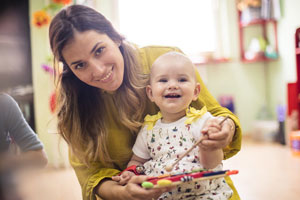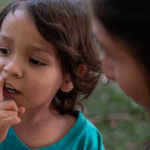
Coronavirus: Well-being tips for nurseries
In the current pandemic, self-care and relaxation have never been more important.

Stacy Mann has kindly offered to share her expertise as a Relax Kids and Charge-Up coach in this blog post to support the sector.
The term ‘self-care’ is changing at this time because there are some very strong emotions coming alongside the ‘normal’.
When you have so much passion for what you do, it is wonderful but also tiring. It is so important to take some quality time for you. There are a few things that you can practise daily, almost like a daily ritual. I say practise, as it must be something you commit to, it’s not something that can just be done once and forgotten about. I’ve heard it referred to as “you brush your teeth daily, so you also have to cleanse your mind”.
Prepare for your day – what is your purpose?
Remind yourself what you want to achieve today. I do this through positive affirmations. Every day, I sit and say them aloud. I have them displayed around my mirror. The more you do them, the more you believe them. Some are simple, like ‘I am amazing’, whereas others are more specific, such as ‘I drink plenty of water every day to cleanse my body and mind’. A good source for positive affirmations for adults is Louise Hay.
Take some time to stretch
My favourite is putting my legs up the wall and breathing, stretching my legs and focusing on the present breath. There are lots of yoga ditties online; it is not about flexibility, more about what you learn whilst breathing and focusing.
Take a break!
Managers, leaders, practitioners and all the adults in the setting need a break! Remember what you want to achieve from a break…. relax, rejuvenate, replenish. I have been in many a staff room in various settings. It is so important that this is a positive environment. Positive quotes, gentle music, fruit etc. Declutter the space…. it is so needed.
Tell others what is great about them
Be there to support each other. Teamwork is so important at this time (and always). Communicate with kindness.
Breathe
In through the nose and out through the mouth. Long, deep and slow breaths. Use your hand as a guide, up the fingers and down the fingers breathing in through the nose and out through the mouth.
Positive affirmations
Positive affirmations are positive statements that you say about yourself and your life. By repeating them often, your brain will begin to believe them, and you can start to make positive changes. Lots of people choose to use positive affirmations to make specific changes or to support their anxieties. They can also be used to boost self-esteem and limit negative self-talk.
It is important to practise positive affirmations daily for the best impact.
Imagine if children used these too! I use them regularly within my relax kids and Charge Up sessions, seeing a huge impact on children and parents.
Download our full guide below to access three activity guides on this too.
Relaxation
Treat yourself to some relaxation! At relax kids, we do relaxation classes for adults called Just Relax. We go from high energy and laughing to complete relaxation, using guided visualisations. The body can restore and be still, calm the ever-chattering mind. It improves sleep, concentration, self-confidence, self-regulation and supports your nervous system, which of course boosts your immune system too. With classes being unavailable face to face, many are still offered online and there are groups such as ‘Join my calm, forget the chaos’ on Facebook to support relaxation and daily rituals.
The SMILE score
The SMILE score, developed by Laura B Vater MD MPH, is a simple technique that can be used with children and adults. It is a self-assessment tool that can be easily adapted to check in with yourself and others each day and adjust accordingly. Each letter in the word SMILE represents one healthy habit and counts as one point. The higher the point score, the higher the well-being on that particular day. The lower the score, the more attention we need to pay to how we are supporting the child and their well-being, and our own:
- S – Sleep. Have you had enough sleep? How is the quality of your sleep? Have you rested and taken some time to relax?
- M – Move. Have you moved your body today? Have you stretched? Maybe take some time to do something physical with the children.
- I – Inhale, exhale. How is the quality of the air you are breathing, for example, have you been outdoors in the fresh air? Have you relaxed, slowing your breathing down?
- L – Love and Connect. Have you connected with others today? Have you shown others you care? Have you led with your heart today?
- E – Eat to Nourish. How much sugar have you had today? Have you eaten fresh fruit and vegetables? Have you eaten enough? Have you eaten too much? Have you had some water?
All of the things in the SMILE score give you a gentle nudge into making adjustments to feel better. For example, if you have scored 2/5, you may want to eat some fruit or drink some water, do some exercise, have a dance or giggle. By checking in with the SMILE score throughout the day, you can and will improve your overall well-being.
Thanks again to Stacy Mann for sharing her expertise on well-being for the sector at this difficult time.
This guide has been written by Stacy Mann, a Relax Kids and Charge-Up coach.
Similar Articles
Early years activity: Sound spotters

Smooth moves: Managing transitions in the setting


